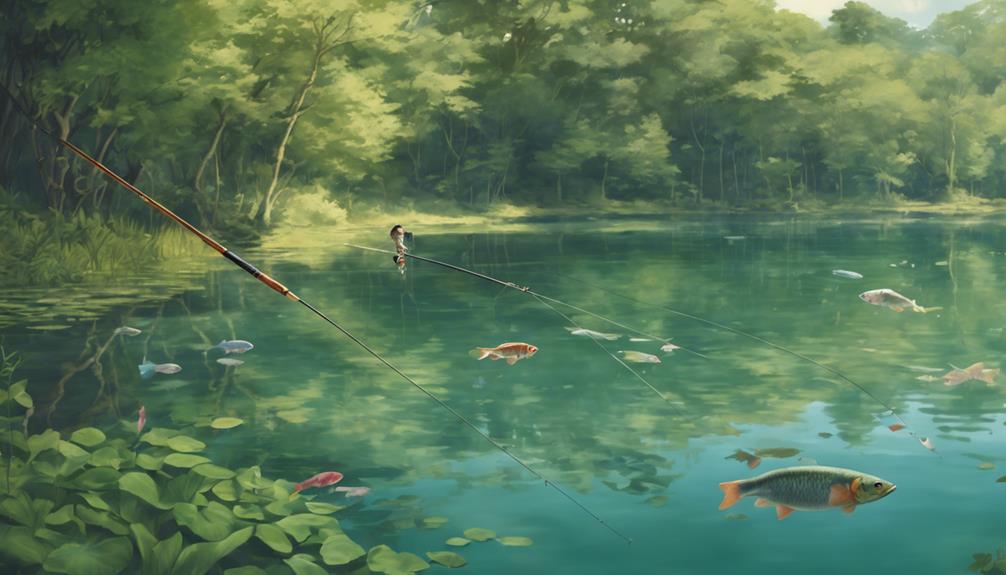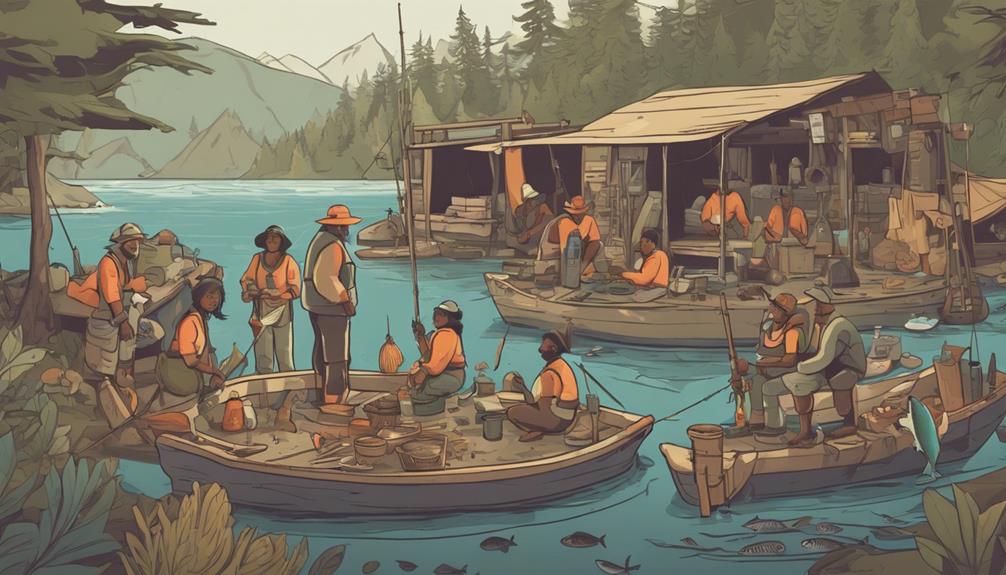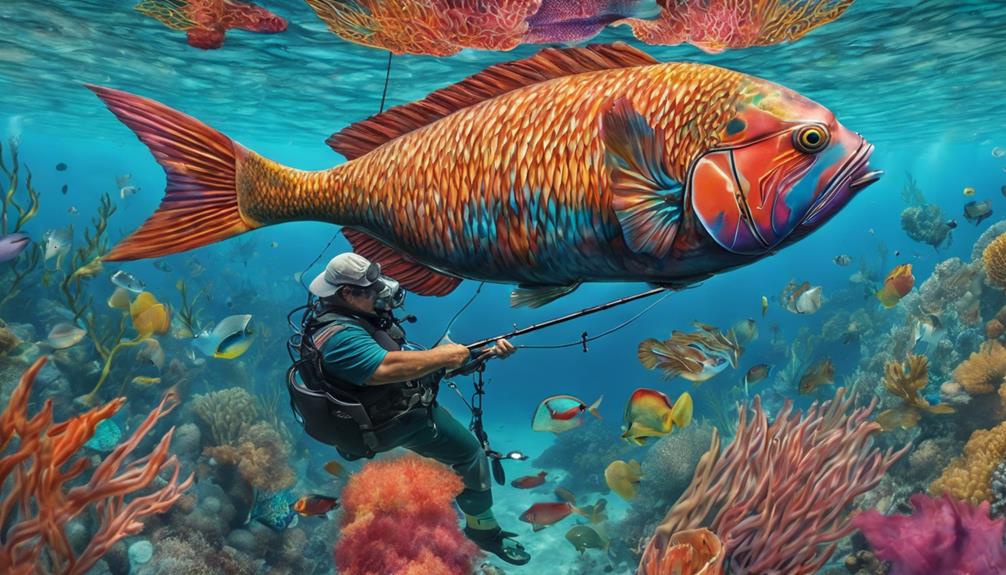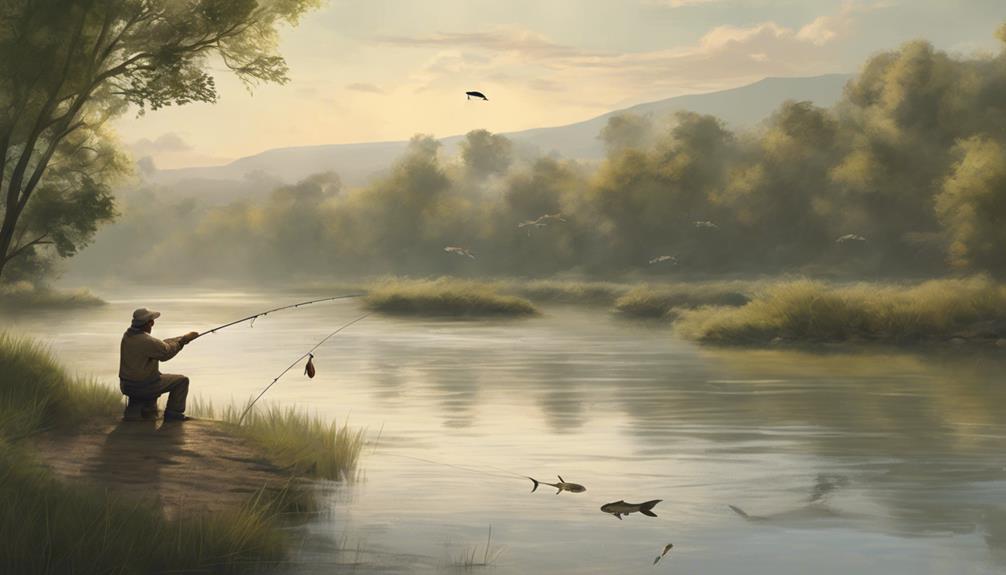Imagine yourself, a beginner angler, setting out to catch your first striped bass in the early morning light. The thrill of the chase, the quiet anticipation as you cast your line into the unknown waters, and the sudden tug on your rod pulling you into a battle of wills with a powerful fish.
This journey into species-specific fishing holds the key to unlocking a world of excitement and challenge, where each catch becomes a triumph of skill and knowledge. But how do you navigate this vast ocean of information and techniques to truly master the art of fishing for specific species?
Choosing the Right Species
When embarking on species-specific fishing, select the right species based on your location, fishing goals, and experience level. Researching habits and identifying targets are crucial steps in this process. To start, research the habits of different fish species in your area. Consider factors like preferred habitats, feeding patterns, and peak activity times. This information will help you narrow down your options and choose a species that aligns with your fishing goals.
Next, focus on identifying targets that match your experience level. For beginners, it's advisable to start with common species that are relatively easy to catch. Panfish like bluegill or crappie are great choices for honing your skills. As you gain more experience, you can gradually move on to more challenging species like bass or trout. Remember, the goal is to set yourself up for success and build confidence in your fishing abilities.
Additionally, consider the equipment you have on hand or are willing to invest in. Certain species may require specific gear or techniques that you may not be familiar with. By choosing a species that aligns with your current resources, you can avoid unnecessary hurdles and enjoy a smoother fishing experience. Ultimately, selecting the right species is a foundational step in your species-specific fishing journey.
Essential Gear for Beginners
Selecting appropriate gear is crucial for beginners delving into species-specific fishing. To ensure you have a successful fishing experience, here are some essential gear and tips to consider:
- Fishing Rod and Reel: Invest in a quality rod and reel that matches the specific species you're targeting. Research the type of rod action and power suitable for the fish you aim to catch.
- Fishing Line: Choose the right fishing line based on the fishing conditions and the targeted species. Make sure to check the line strength and material to avoid breakage during the catch.
- Tackle Box: Organize your fishing tackle efficiently in a tackle box. Include a variety of hooks, sinkers, lures, and other essential terminal tackle to adapt to different fishing situations.
- Sun Protection and Safety Gear: Don't forget to pack sunscreen, a hat, polarized sunglasses, and a first aid kit. Safety should always be a priority when fishing in different environments.
Remember that proper maintenance of your gear is essential for its longevity and optimal performance. Regularly clean your equipment, check for any damages, and store them appropriately after each fishing trip.
Additionally, practice proper casting techniques to improve your accuracy and efficiency when targeting specific species. By having the right gear and mastering essential techniques, you'll be better prepared for a successful species-specific fishing adventure.
Understanding Fish Behavior
To enhance your success in species-specific fishing, understanding fish behavior is key to effectively targeting and catching your desired species. Fish communication plays a crucial role in their behavior, enabling them to convey information about food sources, potential dangers, and mating opportunities. By observing how fish interact with each other, you can gain valuable insights into their movements and habits.
Predator-prey dynamics also influence fish behavior significantly. Knowing the hunting patterns of predatory fish can help you anticipate where they might be lurking and adjust your fishing techniques accordingly. Understanding how fish respond to threats can give you an edge in predicting their behavior and improving your chances of a successful catch.
Fish feeding habits vary among species and can dictate their behavior in specific environments. Some fish are opportunistic feeders, while others are more selective in their diet. By familiarizing yourself with the feeding preferences of your target species, you can tailor your bait or lures to attract them effectively.
Territorial behavior is another essential aspect to consider when fishing. Many fish species are territorial and will defend their space against intruders. Recognizing these behaviors can help you identify prime fishing spots where fish are more likely to be actively feeding.
Locating Hotspots for Fishing
Exploring different underwater structures can lead you to discovering prime hotspots for fishing success. To enhance your fishing experience, follow these tips:
- Using technology: Utilize fish finders or sonar devices to locate underwater structures where fish might be hiding. These tools can help you identify drop-offs, submerged vegetation, or schools of fish, increasing your chances of finding hotspots.
- Reading the water: Pay attention to the water's movement and color. Fish are often found near areas with a good flow of oxygenated water, such as where a river meets a lake or around submerged rocks. Look for changes in water color, as dark patches could indicate deeper areas where fish might be congregating.
- Observing bird activity: Seabirds like seagulls or cormorants can be indicators of fish schools below the surface. If you spot birds diving or circling above a specific area, it's a good sign that there are fish in that location.
- Checking for underwater vegetation: Areas with underwater plants or algae can attract fish seeking shelter or feeding grounds. Look for signs of life like bubbles rising from the vegetation, which could indicate the presence of fish.
Learning Species-Specific Techniques
When targeting specific fish species, honing in on their unique behaviors and preferences can greatly increase your success on the water. Understanding advanced techniques and developing specialized skills tailored to the species you're after can make a significant difference in your fishing endeavors. For instance, when targeting trophy fish, such as large bass or pike, mastering techniques like flipping and pitching can help you accurately place your bait in tight spots where these fish tend to hide.
In competitive angling, where every advantage counts, learning species-specific techniques can give you an edge over other anglers. For example, if you're going after trout in a river, perfecting your drift fishing technique to mimic the natural movement of insects can attract more bites. Similarly, when targeting species like walleye known for their nocturnal feeding habits, using techniques like trolling with crankbaits at night can increase your chances of landing a catch.
Patience and Persistence Pays Off
Exercising patience and persistence while fishing often leads to rewarding outcomes. When you stay determined and focused, you'll find that success is just a cast away. Here's how patience and persistence can help you in your species-specific fishing journey:
- Developing Skills: By patiently practicing your casting technique and learning the behavior of the fish you're targeting, you gradually improve your fishing skills. Each moment spent on the water is an opportunity to hone your abilities and become a more proficient angler.
- Building Confidence: Through persistence, you build confidence in your fishing capabilities. Every missed catch or lost lure is a learning experience that contributes to your growth as a fisherman. Trusting in your skills and knowledge boosts your confidence on the water.
- Overcoming Challenges: Patience and persistence are key to overcoming the challenges that come with fishing. Whether it's dealing with changing weather conditions or adapting to the fish's unpredictable feeding habits, your perseverance will help you navigate through obstacles.
- Achieving Success: Ultimately, the combination of patience and persistence paves the way for success in species-specific fishing. The more you practice and stay dedicated to improving, the more you'll reap the rewards of landing that prized catch. Remember, every moment spent fishing is a step towards achieving your angling goals.
Conservation and Catch-and-Release Practices
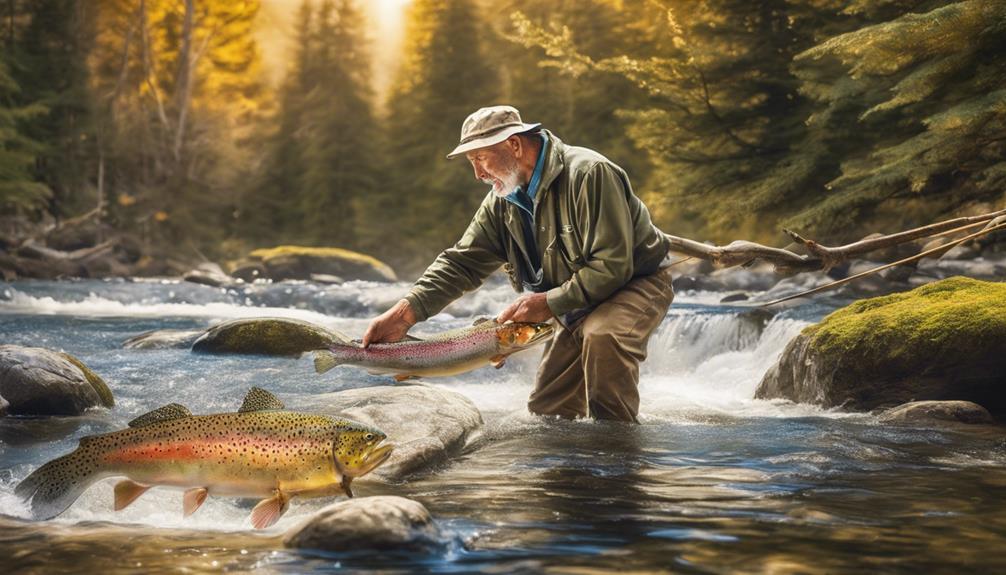
Building upon your commitment to species-specific fishing, a crucial aspect to consider is the implementation of conservation practices and the adoption of catch-and-release techniques to preserve the aquatic ecosystem. Engaging in ethical angling practices and promoting sustainable fishing methods are essential for minimizing the environmental impact of your angling pursuits.
By practicing catch-and-release, you contribute to responsible angling by releasing fish back into their natural habitat unharmed. This approach helps maintain fish populations, allowing them to reproduce and sustain healthy numbers in the ecosystem. When handling fish for release, it's important to minimize stress by handling them gently, avoiding contact with their gills, and releasing them quickly back into the water.
Furthermore, using barbless hooks can make the release process smoother, reducing potential harm to the fish. Remember, the goal of catch-and-release is to ensure the fish's survival after being caught, promoting the long-term health of the fish populations and the overall aquatic environment.
Incorporating conservation and catch-and-release practices into your fishing routine demonstrates a deep respect for nature and a dedication to preserving the delicate balance of aquatic ecosystems. By making these practices a priority, you contribute to the sustainability of fisheries and help protect the diverse marine life for future generations to enjoy.
Joining a Fishing Community
To truly immerse yourself in the world of species-specific fishing, consider connecting with a local fishing community. Here's why joining a fishing community can enhance your fishing experience:
- Building relationships: Being part of a fishing community allows you to meet like-minded individuals who share your passion for fishing. These connections can lead to lasting friendships and provide you with a support system as you navigate the waters of species-specific fishing.
- Sharing experiences: By joining a fishing community, you gain access to a wealth of knowledge and experience from seasoned anglers. You can swap stories, learn new techniques, and benefit from the collective wisdom of the group. This shared camaraderie enhances your fishing outings and helps you grow as an angler.
- Discovering new spots: Fishing communities often have members who are familiar with the best fishing spots for specific species. By tapping into this network, you can expand your fishing horizons and discover hidden gems that you may not have found on your own.
- Organizing group activities: Fishing communities often organize group outings, tournaments, or events. Participating in these activities not only adds a social element to your fishing adventures but also allows you to learn from others and improve your skills in a fun and supportive environment.
Frequently Asked Questions
How Can I Ensure That I Am Fishing in a Sustainable and Environmentally Friendly Manner?
To fish sustainably and eco-friendly, choose responsible practices and gear. Respect conservation rules and ethical guidelines. Use biodegradable bait, barbless hooks, and non-toxic materials.
Release undersized or protected species safely. Keep your fishing spots clean, avoiding littering. Support sustainable fishing initiatives and learn about local ecosystems.
Are There Any Specific Regulations or Restrictions I Need to Be Aware of When Fishing for Certain Species?
When fishing for certain species, you must be aware of regulations and restrictions that govern your actions. These rules are in place to ensure sustainable practices and minimize the environmental impact of fishing activities.
What Are Some Common Mistakes That First-Time Anglers Make When Targeting a Specific Species?
When targeting a specific species, common misconceptions can lead to mistakes. Make sure you have the proper gear for the fish you're after. Key strategies include researching the species' habits and preferred bait.
Location scouting is essential; don't just rely on luck. Many first-time anglers overlook these factors, but with some preparation and attention to detail, you can improve your chances of a successful catch.
How Can I Improve My Casting Accuracy and Technique for Different Species of Fish?
To improve your casting accuracy and technique for different species of fish, focus on consistent practice. Pay attention to your body positioning, arm movement, and release timing.
It's crucial to respect conservation efforts by using proper gear and following ethical fishing practices. By honing your skills, you'll not only enhance your chances of catching fish but also contribute to the sustainability of the ecosystem.
Is It Recommended for Beginners to Hire a Fishing Guide or Instructor When Trying to Target a Specific Species for the First Time?
When targeting a specific species for the first time, hiring a fishing guide or instructor is highly recommended. Going self-taught versus having guidance can make a significant difference in your success rate.
While trial and error can work, having an expert by your side can fast-track your learning process and help you avoid common mistakes. Investing in a guide or instructor can provide valuable knowledge and hands-on experience that will benefit you in the long run.
Conclusion
Now that you've dipped your toes into species-specific fishing, remember to keep learning and exploring. With the right gear, knowledge, and patience, you can continue to improve your skills and experience even more successful fishing trips.
Joining a fishing community can also provide valuable insights and camaraderie. And always remember to practice conservation and catch-and-release practices to ensure the sustainability of our precious fishing resources.
Happy fishing!
